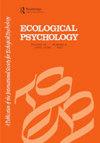The Field of Invitations
IF 1.7
3区 心理学
Q3 PSYCHOLOGY, EXPERIMENTAL
引用次数: 2
Abstract
Abstract In my recent book Affective Gibsonian Psychology (2022), I made a relatively sharp distinction between affordances and invitations. I argued that to understand (some of) our behavior, we need to distinguish between the two. In the present paper, I develop the argument for this distinction a little further. It is argued that the concept of affordances aids in capturing the ecological values in the animals’ environments. This helps one to determine the adaptiveness and appropriateness of behavior. However, drawing upon examples from everyday life, it is argued that the concept of affordances does not suffice to account for our behavior. It needs to be complemented by the concept of the field of invitations. We are affective beings—the world always affects us, and it does so in a rich variety of ways. Hence, any psychology attempting to understand our everyday activity needs to capture how we are moved by the environment. I end with detailing the field of invitations.邀请的领域
在我的新书《情感吉布森心理学》(2022)中,我对允诺和邀请做了一个相对清晰的区分。我认为,为了理解我们的(一些)行为,我们需要区分这两者。在本文中,我进一步发展了这种区别的论点。认为可视性的概念有助于捕捉动物环境中的生态价值。这有助于人们确定行为的适应性和适当性。然而,根据日常生活中的例子,有人认为,启示的概念不足以解释我们的行为。它需要得到邀请领域概念的补充。我们是有情感的生物——世界总是以各种各样的方式影响着我们。因此,任何试图理解我们日常活动的心理学都需要捕捉到我们是如何被环境所感动的。最后,我将详细介绍邀请的领域。
本文章由计算机程序翻译,如有差异,请以英文原文为准。
求助全文
约1分钟内获得全文
求助全文
来源期刊

Ecological Psychology
PSYCHOLOGY, EXPERIMENTAL-
CiteScore
3.30
自引率
10.50%
发文量
8
期刊介绍:
This unique journal publishes original articles that contribute to the understanding of psychological and behavioral processes as they occur within the ecological constraints of animal-environment systems. It focuses on problems of perception, action, cognition, communication, learning, development, and evolution in all species, to the extent that those problems derive from a consideration of whole animal-environment systems, rather than animals or their environments in isolation from each other. Significant contributions may come from such diverse fields as human experimental psychology, developmental/social psychology, animal behavior, human factors, fine arts, communication, computer science, philosophy, physical education and therapy, speech and hearing, and vision research.
 求助内容:
求助内容: 应助结果提醒方式:
应助结果提醒方式:


